To throw away batteries safely, start by understanding the type of battery you have. Single-use batteries may go in the trash, but check local regulations first. Rechargeable and button cell batteries must be recycled due to their hazardous materials. Always store batteries in a cool, dry place and use non-conductive containers to prevent leaks. Many retailers offer drop-off bins, or you can find community recycling events. Don't forget to tape over terminals of 9-volt batteries to avoid sparks. There's plenty more to learn about responsible disposal and recycling, so keep exploring your options!
Key Takeaways
- Check local regulations, as many states classify batteries as hazardous waste requiring specific disposal methods.
- Utilize community recycling events or designated drop-off locations to safely dispose of different battery types.
- Tape over terminals of 9-volt batteries before transport to prevent short-circuiting and fire hazards.
- Store batteries in a cool, dry place and use non-conductive containers to minimize leakage risks.
- Inspect stored batteries regularly for damage and handle any compromised batteries with gloves to ensure safety.
Importance of Safe Battery Disposal
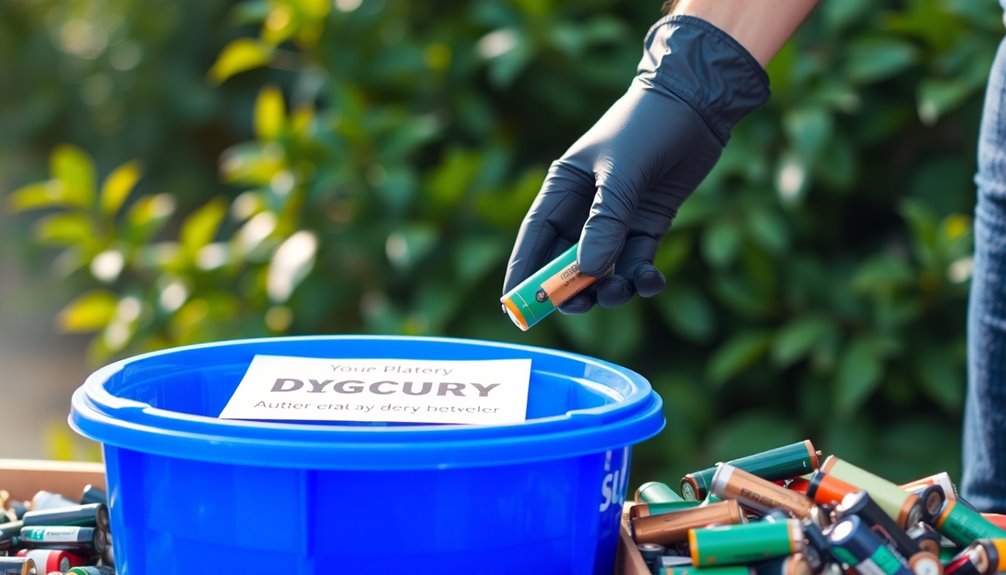
When you consider throwing away batteries, remember that safe disposal is essential for protecting our environment.
Batteries contain hazardous chemicals that can leak into soil and water, leading to toxic contamination. Improper disposal contributes to over 180,000 tons of waste each year, highlighting the need for responsible recycling methods.
Many states classify batteries as hazardous waste, making it illegal to toss them in regular trash. By recycling batteries at designated recycling facilities, you not only avoid legal penalties but also help recover valuable materials like lead and lithium.
This considerably reduces the energy needed for new battery production, making it a safe and eco-friendly choice. Always prioritize responsible disposal to protect our ecosystems and promote a healthier environment.
Types of Batteries and Their Disposal
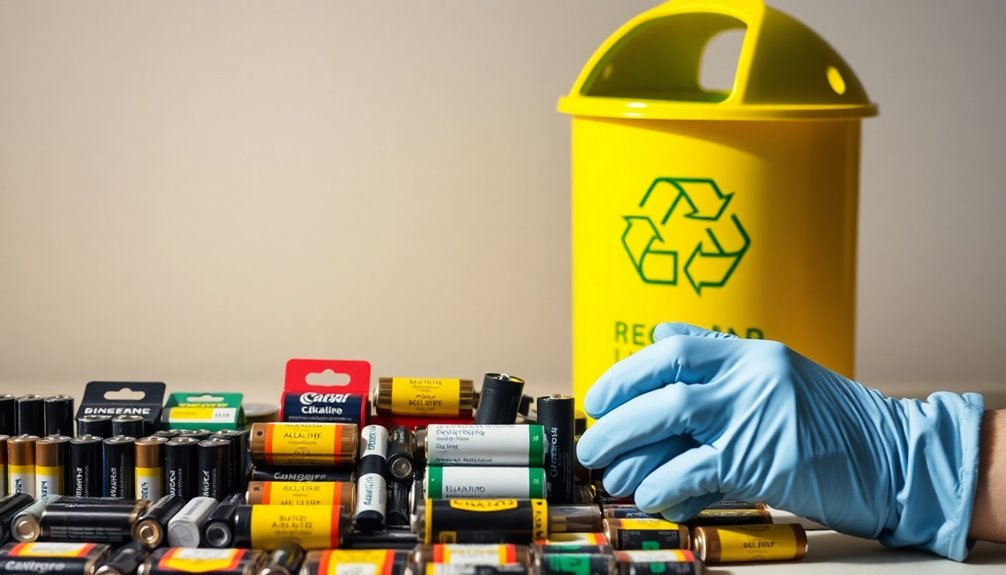
When it comes to disposing of batteries, knowing the differences between single-use and rechargeable types is essential.
Single-use batteries, like alkaline ones, often go in the trash, but rules can vary by state.
On the other hand, you should always recycle rechargeable batteries to keep the environment safe and reclaim valuable materials.
Single-Use Battery Guidelines
Single-use batteries, like AA, AAA, 9V, and D cells, are staples in many households, but responsible disposal is essential to protect the environment.
While alkaline batteries are generally non-hazardous and can often be thrown in the trash, it's better to recycle batteries whenever possible to minimize landfill waste.
In contrast, button cell batteries contain hazardous substances like silver and mercury, requiring special disposal methods—never toss them in regular trash.
Even though you might be able to dispose of batteries in the trash in many areas, improper disposal contributes to over 180,000 tons of battery waste annually.
Check for recycling options through your local solid waste district or retailers to help reduce the environmental impact.
Rechargeable Battery Requirements
Although rechargeable batteries offer convenience and long-term savings, they also require careful disposal to prevent environmental harm.
These batteries—like lithium-ion, nickel-cadmium, and nickel-metal hydride—contain toxic metals that can be hazardous if not disposed of properly. Many states prohibit throwing them in regular trash, highlighting the need for household hazardous waste disposal at designated recycling facilities.
You can easily dispose of rechargeable batteries by using recycling drop-off sites, often found in electronics and home improvement stores. Call2Recycle can help you locate these sites and offers mail-in recycling programs for added convenience.
Methods for Recycling Batteries
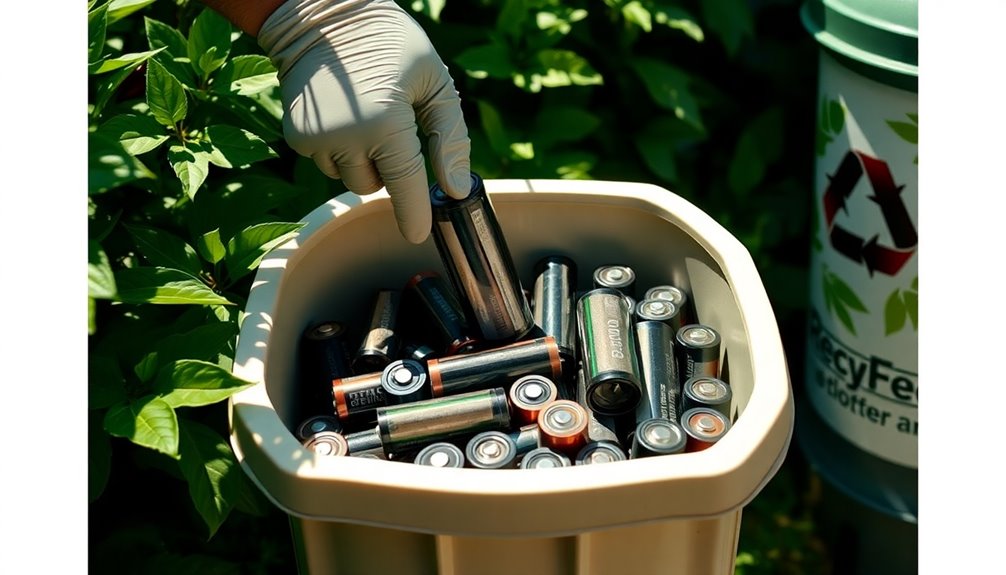
Recycling batteries is easier than ever, thanks to various accessible methods designed for responsible disposal.
Many local solid waste districts offer collection programs specifically for different battery types, making it simple for you to recycle. Retailers like Home Depot provide battery drop-off bins for rechargeable batteries at no cost.
If you prefer convenience, consider mail-in recycling programs like Call2Recycle, where you can send in spent batteries using prepaid shipping kits. Additionally, community events organized by local municipalities often designate specific days for battery recycling.
To find nearby recycling facilities that accept your batteries, utilize Earth911's Recycling Search.
Safety Tips for Disposal
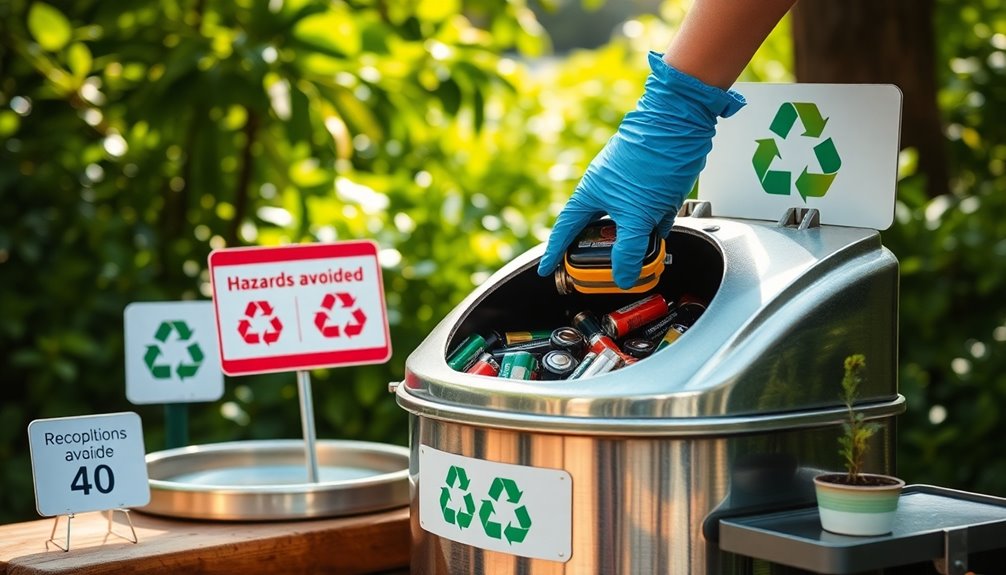
When it comes to disposing of batteries, proper storage and safe transport are essential.
Keep your batteries in a cool, dry place to avoid leaks and potential fires.
Always tape over the terminals, especially for 9-volt batteries, to prevent short-circuiting during transport.
Proper Storage Guidelines
To guarantee your batteries are stored safely, keep them in a cool, dry place, as extreme temperatures can compromise their integrity.
Use non-conductive containers, like plastic bins, to minimize risks of leakage and fire hazards during storage.
It's crucial to tape over the terminals of 9-volt batteries to prevent accidental short-circuiting, which could cause fires.
Avoid mixing different types of batteries in the same container; this can lead to dangerous chemical reactions that may result in leaks or even explosions.
Regularly check your stored batteries for any signs of damage or leakage.
If you find compromised batteries, handle them with gloves to protect yourself from harmful substances.
Proper storage is key to ensuring safety and prolonging battery life.
Safe Transport Practices
After guaranteeing your batteries are stored properly, it's important to focus on safe transport practices for disposal.
Always store batteries in a cool, dry place to minimize leakage and fire hazards during transport. When transporting batteries, use non-conductive containers like cardboard boxes or plastic tubs to reduce the risk of sparks.
For 9-volt batteries, cover the terminals with non-conductive tape to prevent short-circuiting. Avoid mixing different types of batteries in the same container, as this can lead to harmful chemical reactions.
Finally, be sure to follow your local guidelines for hazardous waste transport to guarantee safe handling and compliance with regulations.
Taking these precautions will help keep you and the environment safe during battery disposal.
State-Specific Disposal Regulations
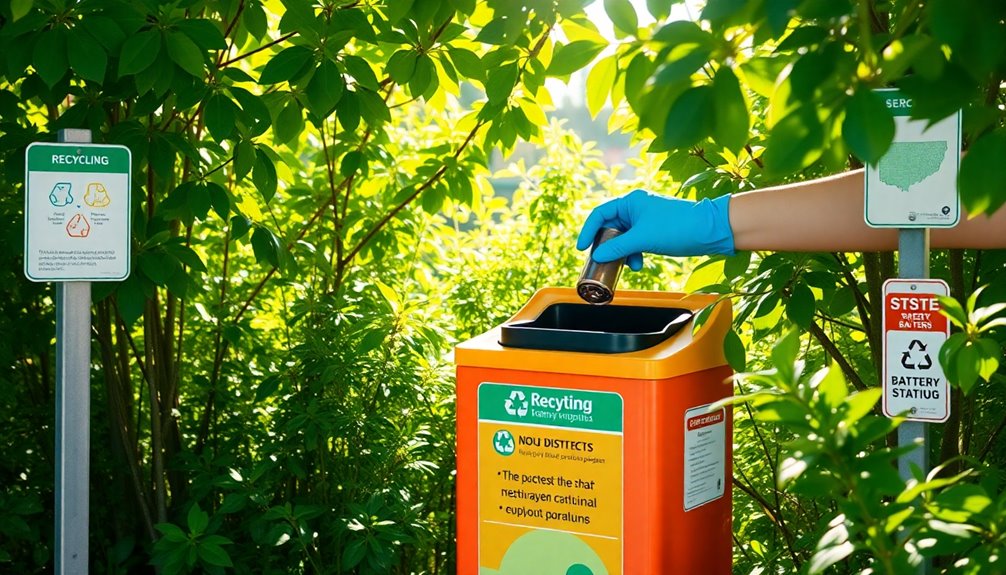
Disposing of batteries safely requires you to navigate various state-specific regulations that can vary widely.
For instance, in California, all batteries are classified as hazardous waste, making it illegal to throw away in regular trash; you must recycle them at designated facilities.
Texas mandates returning automotive batteries to retailers or recycling centers.
Many states have specific regulations for rechargeable batteries in use, prohibiting disposal due to toxic metals like cadmium and lead.
In New York, retailers must accept used batteries for recycling, guaranteeing accessible options for consumers.
Always check local government websites for state-specific battery disposal mandates to avoid fines and guarantee proper recycling through battery manufacturers and recycling facilities.
Community Recycling Initiatives
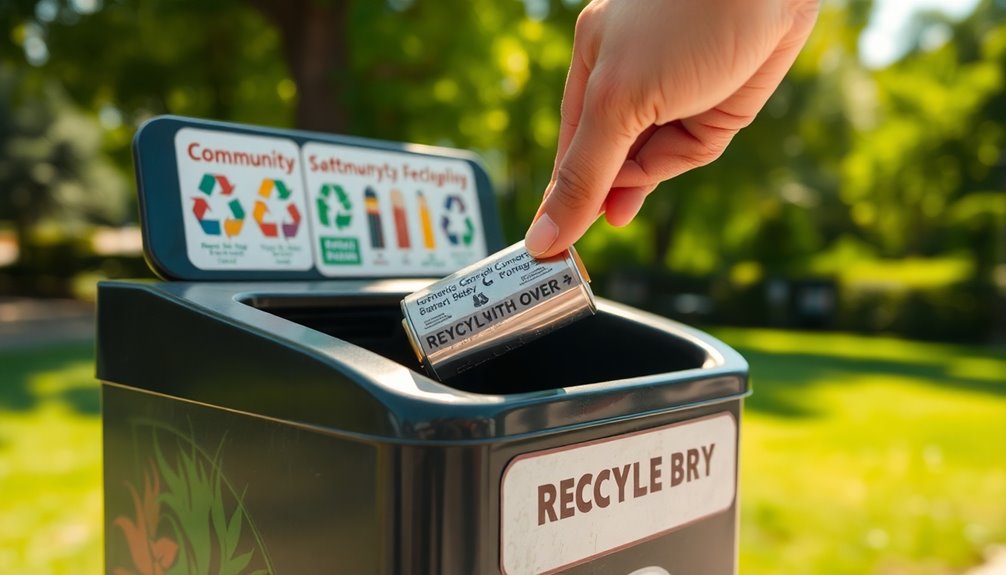
Many communities are stepping up to make battery recycling more accessible and effective. Local governments are organizing battery collection events that allow you to safely dispose of both rechargeable and single-use batteries.
These community recycling initiatives often partner with organizations like Call2Recycle, providing designated drop-off locations. By participating in these events, you'll learn proper recycling practices and understand the environmental impact of improper disposal.
Educational programs also aim to boost participation, emphasizing the importance of recycling valuable materials. Additionally, neighborhood cleanup drives often incorporate battery collection, fostering engagement and encouraging sustainable practices.
Keep an eye on social media and newsletters to stay informed about upcoming battery recycling events in your area and help make a difference!
Frequently Asked Questions
How Do You Dispose of Batteries Properly?
To dispose of batteries properly, start by checking your local regulations, as rules can vary.
For alkaline batteries, recycle them if possible, even though they're often non-hazardous.
Never toss rechargeable batteries in the trash; take them to recycling centers instead.
Tape the terminals of 9-volt batteries to prevent short-circuiting.
Utilize resources like Call2Recycle to locate nearby drop-off locations, ensuring you're following safe and eco-friendly practices.
Can You Get in Trouble for Throwing Away Batteries?
You could land in a legal nightmare just for tossing batteries in the trash!
Yes, you can get in trouble for throwing away batteries improperly, especially in states like California. They classify all batteries as hazardous waste, and you risk fines if you don't recycle them at designated facilities.
Even alkaline batteries have specific disposal rules.
How to Dispose of a Battery That Is About to Explode?
If you've got a battery that's about to explode, handle it with extreme caution.
First, wear gloves and safety goggles to protect yourself. Carefully place the battery in a non-conductive container, ensuring it's secure.
Tape over the terminals, especially for 9-volt batteries, to prevent any short-circuiting. Don't try to open or puncture it.
Finally, contact your local hazardous waste facility for safe disposal guidance and proper compliance with regulations.
How Do You Dispose of a Bad Battery?
Imagine a miniature volcano, ready to erupt in your trash can.
To dispose of a bad battery, start by taping over the terminals to prevent short-circuiting. Check your local regulations—many areas classify batteries as hazardous waste. Instead of tossing them in the bin, find a recycling center like Call2Recycle.
Always store leaking batteries in a cool, dry place, and wear gloves when handling them for safety. You've got this!
Conclusion
In summary, disposing of batteries safely isn't just a good idea; it's essential for protecting our environment. By understanding the different battery types and their disposal methods, you can guarantee you're doing your part. Remember, one person's careless disposal can lead to big problems down the line. So, don't just toss them aside—take the time to recycle properly and support community initiatives. Together, we can keep our planet safe for future generations!










